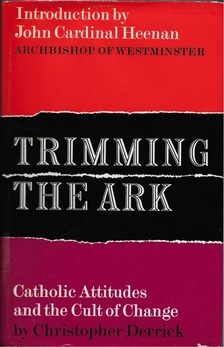|
Since the Second Vatican Council, much has been made of the need for aggriornamento, a modernization of the Faith. It is generally supposed that this is necessary to evangelize modern people with any success. We must "speak their language," it is thought, if we expect them to hear. Where our liturgical worship is concerned, this has been taken quite literally. In fact, the attempt to modernize the Faith is perhaps seen nowhere as clearly as in the reforms of the Sacred Liturgy carried out by the Consilium, the group which was given the charge to implement the call to reform of the Council Fathers. Their work produced the Novus Ordo Missae, a new rite of the Mass which has now become the "ordinary form," promulgated by Pope Paul VI in 1969. Let us take the words "from the horse's mouth." Fr. Antoine Dumas, O.S.B was the relator[1] of the study group (Coetus 18bis) tasked with the reform of all the orations of the Mass. In a 1971 essay explaining the principles which motivated the revisions produced by his group, Fr. Dumas tells us that the authors of the "renewal" were very intent "that the texts and rites might be perfectly—or at the least much better—accommodated to the modern mentality to which it must give expression."[2] "Other texts," he says, "having become shocking for the man of today, have been frankly corrected."[3] Again, Fr. Dumas tells us that some revisions were made in order to "change the direction" of certain phrases "from a negative to a more dynamic position." For an example of such a revision, Fr. Dumas offers the prayer after communion for the fourth Sunday of Paschaltide, where "diabolica non sinas incursione lacerari [may you not allow (us) to be wounded by diabolical attack]" now reads "in aeternis pascuis collocare digneris [may you vouchsafe to place (us) in eternal pastures]". A second example is also offered from the prayer over the offerings, formerly for the eleventh Sunday after Pentecost, now for tenth Sunday per annum: "nostrae fragilitatis subsidium (a help to our frailty)" is changed to read "nostrae caritatis augmentum (an increase of our charity)."[4] This talk of "accommodation to the modern mentality," removing that which is "shocking for the man of today," or too "negative"--which, given Fr. Dumas' examples, simply means the recognition of human frailty and the threat of demonic attacks--shows quite clearly an underlying presupposition of modern attempts at evangelization and ecumenism. It is assumed that the Faith must be rid of that which makes it hateful to modern ears, and the result will be that men will see the Faith for "what it really is," and then be more likely to submit themselves to it. Unfortunately, what has actually happened is altogether different. Modern man, having been shown a Faith that is perfectly "accommodated" to them, has thus found it to be completely irrelevant. The irony will not be lost on thoughtful readers. While much can be written about this, at the moment I only want to point readers to a substantial passage from Christopher Derrick, writing in his book Trimming the Ark around the same time Fr. Dumas was doing his work. He expresses clearly that a Church which makes modernization and relevancy its primary goals only succeeds in proving finally that it is antiquated and irrelevant:
Written by Peter Youngblood, DRE and Choir Director at Saint Leo IV Roman Catholic Church in Roberts Cove, La, and Co-founder & Tutor of Saint John of the Cross Academy.
_________________________________ [1] Lauren Pristas, "The Orations of the Vatican II Missal: Policies for Revision", Communio 30 (Winter 2003), p. 627 [2] ibid, p. 633. The essay is reproduced in its entirety in the article from Dr. Pristas cited above. [3] ibid, p. 635. See especially the example cited by Fr. Dumas: "For example, the former secret for Saturday of the second week of Lent, which has become the prayer over the offerings for the third Sunday of Lent, changes the expression: non gravemur externis [may we not be weighed down (by the sins) of those outside], difficult to understand, to: fraterna dimittere studeamus [may we strive/be eager to forgive (the sins) of our brothers], decidedly more evangelical." [4] ibid., p. 635-6. Translations are those of Lauren Pristas. [5] Christopher Derrick, Trimming the Ark: Catholic Attitudes and the Cult of Change, Hutchinson & CO, 1967, pp. 142-144 |
AuthorsThe authors of this blog are the tutors of Saint John of the Cross Academy: Archives
November 2016
Categories
All
|

 RSS Feed
RSS Feed